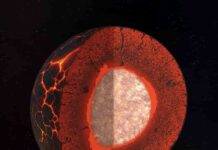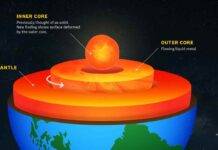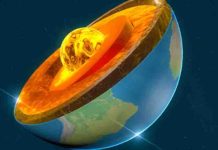
Scientists have long debated the origins of Earth’s water. It made human life possible, distinguishing our lush planet from the barren ones that surround us. But how did it get here? While it seems likely that the water in our solar system is very old, scientists aren’t sure whether Earth formed with water molecules on it or those molecules arrived later, hitching a ride on an asteroid that collided with us.
In a study published Thursday in Science, researchers present new evidence that Earth has had its water since the very beginning — no asteroids required.
The researchers suggest that the H2O-rich grains of dust that helped form the planet were able to retain that liquid water as Earth was born.
To find evidence of this ancient water, they had to find the most pristine possible samples of an infant Earth. That’s a tall order, since Earth is a living, dynamic world — you can’t pick up a rock and assume that it’s anything like it was 4.6 billion years ago.
But if you can get rocks straight from a relatively untouched region of the Earth’s mantle, that’s another story. And luckily these scientists had just the thing: volcanic rocks taken from the arctic Baffin Island in 1985.
“On their way to the surface, these rocks were never affected by sedimentary input from crustal rocks, and previous research shows their source region has remained untouched since Earth’s formation,” lead study author Lydia Hallis, a researcher at the University of Glasgow, said in a statement. “Essentially, they are some of the most primitive rocks we’ve ever found on Earth’s surface, and so the water they contain gives us an invaluable insight into Earth’s early history and where its water came from.”
Then Hallis and her colleagues turned to a classic test for water origin. They looked for deuterium, a modified form of hydrogen that creates what we call “heavy water.” Scientists have found that the ratio of deuterium to hydrogen creates a unique signature in the water of every planet, comet, or asteroid. So if Earth’s earliest water seemed especially similar to something we’d expect from a chunk of asteroid, for example, we’d suspect that our first water had been delivered by a violent collision.
In this case, however, the scientists found water that was very poor in deuterium.
According to Hallis, this makes it more likely that Earth’s water came from the dust that formed our solar system’s planets. A lot of this liquid would have evaporated as these dust particles fused together to give birth to Earth, but these findings suggest that enough of it remained to seed our planet with water.
There are still plenty of questions to answer about the serendipitous wetness of our planet. Since water is necessary for life (at least as we know it), figuring out just how lucky we were to end up on a planet covered in ocean could help scientists determine how likely life is out in the rest of the universe.
Note: The above post is reprinted from materials provided by The Washington Post. The original article was written by Rachel Feltman.










